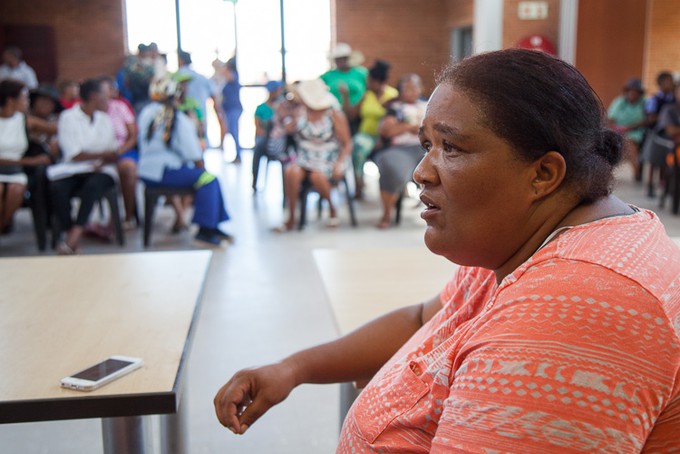Move to make way for mine turns sour for Northern Cape residents
Dozens of families that relocated from Dingleton to Siyathemba thought they would be better off
“Kumba promised us that we will be better off but we are not. We are really not,” said Roletta van der Linde a resident of Siyathemba, the newly constructed settlement on the outskirts of Kathu in the Northern Cape.
Van der Linde moved to Siyathemba from Dingleton as part of a relocation agreement with Kumba Iron Ore, a subsidiary of Anglo American, who needed the town of Dingleton to expand Sishen mine. Most of Dingleton has since relocated to Siyathemba, where they received a new house, as well as inconvenience pay and a setup allowance totalling about R30,000. Kumba is also paying the increase in municipal rates and taxes for about 20 years. Those who remain in Dingleton are refusing to accept this offer.
But some of the residents who have moved to Siyathemba are also unhappy. Van der Linde said that Kumba made them promises but that once they moved there was “nothing that [Kumba] promised us”.
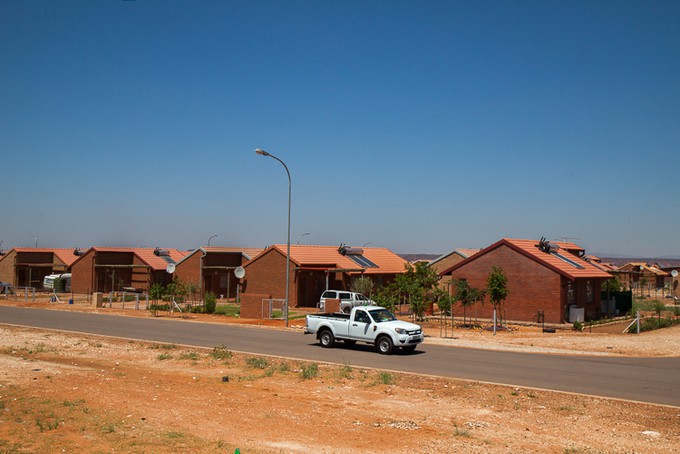
When we visited Siyathemba, a group of about 50 disgruntled residents had assembled in the new hall. “Kumba said to us that we are going to be better off in Siyathemba in comparison to how we lived in Dingleton. But now we live [in] worse [conditions] than how we lived in Dingleton,” said Monica Jonathan.
Jonathan said that one of their main concerns is that there was no clinic in Siyathemba despite the first people relocating at the end of 2014. Up until last week, the clinic was still situated in Dingleton but this past weekend the clinic finally relocated to Siyathemba. Over 450 families relocated from Dingleton to Siyathemba.
The shops in the small shopping centre in Siyathemba stand empty and the settlement is still sparse as the trees that have been planted are still saplings. The facebrick houses are modern and attractive, but Poppie Nero, one of those who is refusing to move to Siyathemba, said that while their exteriors’ are “pretty”, they are “a mess” inside.
However, Kumba attests that “community satisfaction with their relocation has been high”. They cite an independent “livelihood monitor survey” done at the end of last year where nearly 40% of the 235 residents who were interviewed, rated their level of satisfaction as “very good” and nearly all rated it as “satisfactory” or better. Only two residents rated it as “poor”.
Cracked walls, leaking roofs and unhappy residents
A number of houses that we visited had cracks in the walls and visible water damage. One house’s window frame had been completely ripped out in the wind and another’s ceiling was caving in.
Louisa Raimundo, whose mother’s ceiling has gaping holes in it, said that Kumba told them that it cannot do anything as it was damaged by the company that installed the DSTV. But the installation company told Raimundo that they hadn’t damaged the ceiling. Now Raimundo is left with a ceiling that is threatening to collapse.
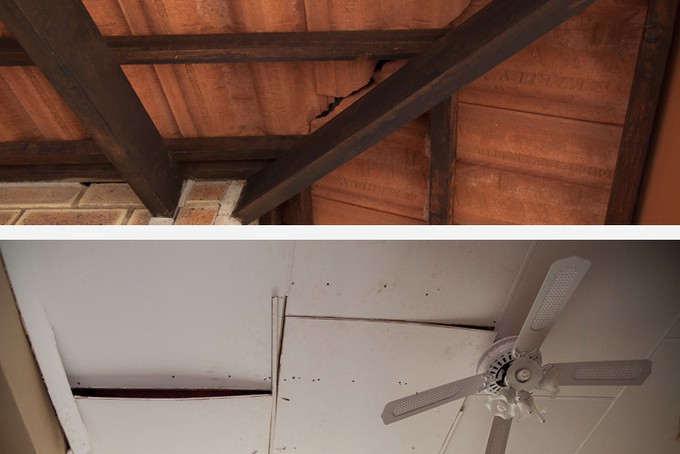
Theresa Faz-Tudo, also a resident of Siyathemba, said that when it rains, “water passes through the house”.
Another resident said that the weakest building materials were used in the construction of the houses, and points to cracks and large dents in her concrete walls. Gently rubbing at these dents emits a flurry of dust.
Kumba admits that there have been some “some minor snags that residents are reporting regarding their new home” but it says “to date no major defects has been reported, and all of these issues are logged and followed up”.
“There is a contractor currently onsite attending to these issues that are logged by residents,” said Kumba in a response to GroundUp.
Calls for compensation
Although Kumba has paid out the approximately R30,000 inconvenience pay and moving allowance, some residents are now demanding compensation. Their demand is in part fuelled by the possibility that the remaining residents in Dingleton who have refused to move will get paid out large amounts. One Siyathemba resident warned that she is ready to move back to her house in Dingleton if their demands are not met.
“We are looking for our compensation. We are here for almost a year and we haven’t got the money yet,” said van der Linde.
This is echoed by Jonathan. “Kumba must give us compensation. [Kumba] mustn’t think that because we moved out we are satisfied. We are not satisfied,” she said. “If they give money to one person, they must give money to everyone. We all came out of Dingleton. Kumba must beware.”
The issue of compensation was also raised by the Lang family who remain in Dingleton. They said that they also initially understood that the deal with Kumba would include compensation but that the final agreement omitted this.
“We are like dogs, they have just chased us away”
Kelebogile Maleo was renting in Dingleton is also unhappy because a hostel that Kumba constructed for her and other renters is not yet ready for occupation. “Now we want to know, we the renters, what is Kumba going to do about us? We are homeless now, we have nowhere to go. Kumba doesn’t’ want us to build shanties onto our parents’ house. We are still sleeping on our parents’ couch,” she said.
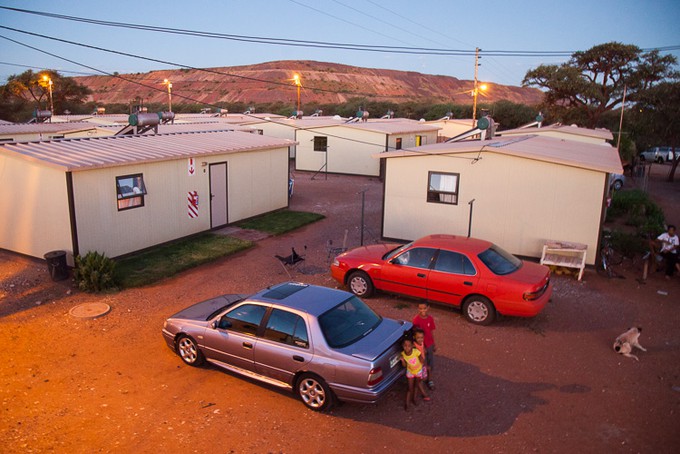
Other former renters were moved to containers a short distance from Dingleton. It is hard to convey the remoteness of this settlement. As you drive past it emerges suddenly through the kameeldoring trees and is gone as quickly as it came. The containers, although relatively spacious and homely inside, are situated on dusty ground, in a completely isolated area. Dingleton itself, which is about a 20 minute walk away from the settlement, has no shops and but for the few remaining families determined not to move, has become a ghost town.
The residents are now being told that they are to move to the newly built hostel. This is despite some of them having rented freestanding homes in Dingleton. Dina Lottering has lived in the small settlement for two years but grew up in Dingleton. There she lived as a backyard dweller off of her mother’s home. She said that Kumba promised her that they would only stay in the containers for a short time and would then receive an RDP house. But this has come to nothing.
Lottering said that they have asked Kumba if they can move to Siyathemba and continue to stay in their containers but they haven’t received a response. “We are like dogs, they have just chased us away,” she said.
Natasha Eksteen who lives with her boyfriend and child in the remote settlement said that they had received a lot of promises from Kumba but that after they moved to the containers, “all the promises went down the drain, they just didn’t care”.
“[They] just came and said that we must go to the hostel. But for me it is unrealistic, you can never move to a hostel with a child,” she said. In a hostel she said she will have to share a kitchen and a toilet with other people, whereas now she has her own three bedroom home.
“Hell may come but we are not going there, to the hostel,” said Lottering.
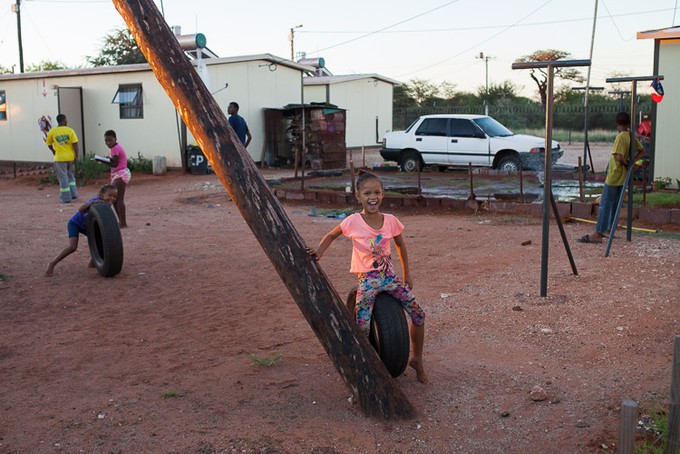
Support independent journalism
Donate using Payfast

Don't miss out on the latest news
We respect your privacy, and promise we won't spam you.
Letters
Dear Editor
Plans by any mine to move long time residents are never honest. It's always for the mining companies greed. The residents are always moved to places where they are/would be worse off. Never to have the same quality of life, space, greenery garden or community structures. Poor workmanship of dwellings..built in desert surroundings. A hostel offer for families is a disgrace. The mines make money and stand to gain by moving poor people to unacceptable facilities. Where are their humanity ethics? Obviously they are non existent. Shame on them!
© 2017 GroundUp. 
This article is licensed under a Creative Commons Attribution-NoDerivatives 4.0 International License.
You may republish this article, so long as you credit the authors and GroundUp, and do not change the text. Please include a link back to the original article.

